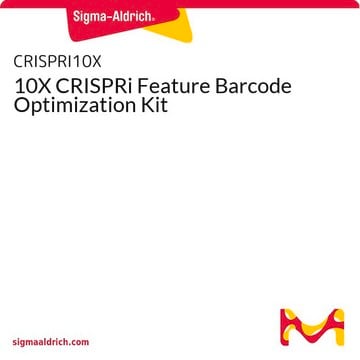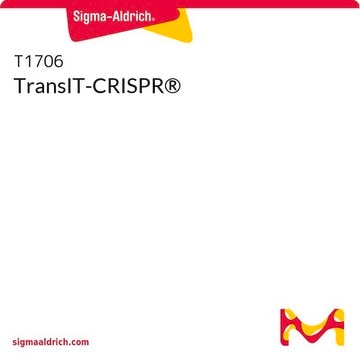CRISPRPL01
CRISPR GUS GAPDH Reporter Control for Monocots
About This Item
Prodotti consigliati
Ricombinante
expressed in E. coli
Livello qualitativo
Confezionamento
vial of 50 μL
Concentrazione
20 ng/μL in TE buffer; DNA (1μg of plasmid DNA)
applicazioni
CRISPR
Selezione
kanamycin
Condizioni di spedizione
dry ice
Temperatura di conservazione
−20°C
Categorie correlate
Descrizione generale
CRISPR Plant Cas9 products are intended for Agrobacterium-mediated plant transformation. The products are based on the type IIA CRISPR-Cas9 derived from Streptococcus pyogenes. The native Cas9 coding sequence is codon optimized for expression in monocots and dicots, respectively. The monocot Cas9 constructs contain a monocot U6 promoter for sgRNA expression, and the dicot Cas9 constructs contain a dicot U6 promoter.
Arabidopsis seedlings were germinated in 6 well tissue culture plates. The seedlings were infected with Agrobacterium which had the CRISPR plasmids with a GUS reporter. After 3-4 days of transfection the GUS expression was detected. b-glucuronidase (GUS) is an enzyme that hydrolyzes colorless glucuronides to yield colored product
Applicazioni
- To verify successful integration of T-DNA in plant genome
- GUS receptor wheat gGAPDH control for monocots for Agrobacterium mediated transformation
Caratteristiche e vantaggi
- Low cost, genome editing option compared to other methods.
- Easy to use
- Online ordering
- Ready to ship in 2 days
Componenti
Keep reagent tubes closed when not in use.
Practice aseptic lab technique to avoid DNase contamination.
Principio
Altre note
Note legali
Codice della classe di stoccaggio
12 - Non Combustible Liquids
Classe di pericolosità dell'acqua (WGK)
WGK 1
Punto d’infiammabilità (°F)
Not applicable
Punto d’infiammabilità (°C)
Not applicable
Scegli una delle versioni più recenti:
Certificati d'analisi (COA)
It looks like we've run into a problem, but you can still download Certificates of Analysis from our Documenti section.
Se ti serve aiuto, non esitare a contattarci Servizio Clienti
Possiedi già questo prodotto?
I documenti relativi ai prodotti acquistati recentemente sono disponibili nell’Archivio dei documenti.
Protocolli
ZFNs and CRISPR/Cas9 advance targeted genome editing, opening new research avenues.
Contenuto correlato
Explore technology and reagent portfolios for plant breeding workflows, accelerating the development of new crop varieties.
Active Filters
Il team dei nostri ricercatori vanta grande esperienza in tutte le aree della ricerca quali Life Science, scienza dei materiali, sintesi chimica, cromatografia, discipline analitiche, ecc..
Contatta l'Assistenza Tecnica.







